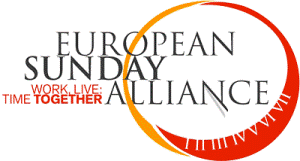On 20 June 2011 the European Sunday Alliance was formed on the occasion of an expert conference on Sunday Protection at the seat of the European Economic and Social Committee (EESC) in Brussels. The European Sunday Alliance is a network of existing national Sunday alliances, trade unions, civil society organizations and religious communities which promotes fair and balanced work conditions and the harmony of a balanced lifestyle comprising work, family and free time to strengthen social cohesion. The alliance further requests for Sundays to be work free in the new working guidelines (2003/88/EG) to be negotiated among EU member states.
According to the alliance the ‘first European Conference on the awareness of a work free Sunday’ in the European Parliament in Brussels on 24 March 2010 was the trigger for the formation of the European Sunday Alliance. The representatives of the various organizations formulated a founding charter which stresses fair, healthy, safe and dignified working conditions as well as the right on a limitation of the maximum working hours, on a daily and weekly rest period and paid annual leave.
“A work free Sunday and appropriate working hours are a well deserved right for all citizens of Europe” states the founding charter of the alliance. All employees have the right for appropriate working hours which in principle exclude “late evenings, nights, public holidays and Sundays” from regular work.
Work on Sunday harms a healthy work life balance
According to a study by Deloitte Consulting commissioned by the European Commission non-regular working hours would harm the social rhythm which would increasingly lead to stress and illness with the employees. Non sustainable working rhythms in conjunction with minimal employment were a substantial source of the increasing phenomena of the ’working poor’ in Europe.
“Sunday work would harm a healthy work life balance” according to the ‘Austrian alliance for a work free Sunday’, one of the leading founding members of the European Sunday Alliance in Brussels. A work free day during the week as a compensation would not alleviate the negative effects. People who work on Sundays or during irregular hours would do this because of financial necessity and not by choice. A common weekly day of rest would provide a common focal point for the time rhythm in state and society which would strengthen the social cohesiveness in all EU member states.
Reactions to the Inception of the European Sunday Alliance
The retired roman catholic bishop of Linz and former professor bishop for social questions at the Austrian bishops conference, Maximilian Aichern, expressed his delight to the inception of the European Sunday Alliance and made the following statement through the communications department of the Linz diocese: “A Sunday free of work is the oldest social law of the Christian-Jewish civilisation rooted in the old testament covenant (3rd of the 10 commandments). The common day of rest, the social contacts which go with it and the praising of the Lord are the most important Christian values and which are indispensible for the human dignity.”
“The fight for a work free Sunday in Europe ought to be fought on national, regional or local levels”, says Hannes Kreller, human resources expert of the catholic employee federation (KAB) in Germany. According to the KAB it is hoped, with the inception of the European Sunday Alliance, to better coordinate the activities between the various alliances as well as to increase the pressure on the EU Parliament and the EU Commission
The Jewish community as well as the Seventh-day Adventist church, an independent evangelical church does not rest on Sunday but recognises the Saturday (Sabbath) as the biblical day of rest. When approached by APD the European Jewish Congress (EJC) had no comments yet on its assessment of the inception of the European Sunday Alliance.
Pastor Raafat Kamal, director for Public Affairs and Religious Liberty of the North European Headquarters of the Seventh-day Adventist Church, in St. Albans, near London, commented on the launching of the European Sunday Alliance as follows: "We support the notion that people need a day of rest to achieve a life/work-balance to maintain the health and safety of workers. This is modelled by God in the biblical creation week where he worked for six days and rested on the seventh. At the same time, we want to be sure that those who don't have Sunday as a designated religious day of rest will be respected and tolerated. I hope that the partners in the European Sunday Alliance network who are trying to raise awareness of the value of synchronised free Sunday for European societies will appreciate the pluralistic dimensions of the European Union countries and the importance of respecting those with different religious beliefs and practices. I also trust that this advocacy campaign for protection of a work-free Sunday will not result in escalation of tension among different groups.”

